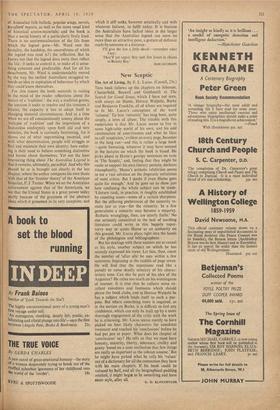New Sceptic
The Art of Living. By F. L. Lucas. (Cassell, 25s.) Tans book follows up the chapters on Johnson, Chesterfield, Boswell and Goldsmith in The Search for Good Sense, which 1 have not seen, with essays on Hume, Horace Walpole, Burke and Benjamin Franklin, all of whom are required to fit Mr. Lucas's conception of the word 'rational.' To him 'romantic' has long been, quite simply, a term of abuse. The trouble with this esotericism is that Mr. Lucas seems to live in some high-table world of his own, and his odd combination of assertiveness and what he likes to call 'scepticism,' evident on every page, becomes in the long run—and this is rather a large book —quite bemusing, whatever it may have seemed in the lectures on which the book is based. He picks about in Hume's gossipy sentences on taste in 'The Sceptic,' and, feeling that they might be made to support his own literary posture, declares triumphantly, 'Hume's aesthetic relativism seems to me a vast advance on the dogmatic certainties of most critics. But I doubt if even Hume goes quite far enough.' And he goes on to show just how confusing the whole subject can be made. 'Literary rank, in practice, is roughly established by counting noses—noses of a certain sharpness. But the differing preferences of the minority re- main just as true—for the minority. In a few generations a minority may become a majority. /Esthetic wranglings, then, are utterly futile.' No one seriously committed to the task of teaching literature could write in this happily topsy- turvy way or quote Hume as an authority on this ground. Mr. Lucas plays right into the hands of the philologists and bibliographers.
But his dealings with these matters are as casual as his style, another subject on which he has recently expressed his views. Let him, then, count the number of 'after ails' he uses within a few sentences, beginning at the middle of page seven. He will find that the repetitions read like a parody or some deadly mimicry of his charac- teristic tone. Can this be part of his idea of the Augustan? He relies too much on his winningness of manner. It is true that he collects some ex- cellent anecdotes and footnotes which should please the book clubs, and in Horace Walpole he has a subject which lends itself to such a pur- pose. But where something more is required, as in the section on Burke, it is difficult to feel any confidence, which can only be built up by a more thorough engagement of the critic with the work he is criticising. Mr. Lucas seems merely to have picked on four likely characters for anecdotal treatment and reached his 'conclusions' before he had put pen to paper. What does his chapter of 'conclusions' say? He tells us that we must have honesty, sincerity, liberty, tolerance, civility and gaiety 'based on a sane realisation that few things are really so important as the solemn assume.' But he might have picked what he calls his 'values' out of a dictionary for all the connection they have with his main chapters. If his book could be reduced by half, and all the biographical padding omitted, it might begin to be something and have
more style, after all.
G D. KLINGOPULOS














































 Previous page
Previous page